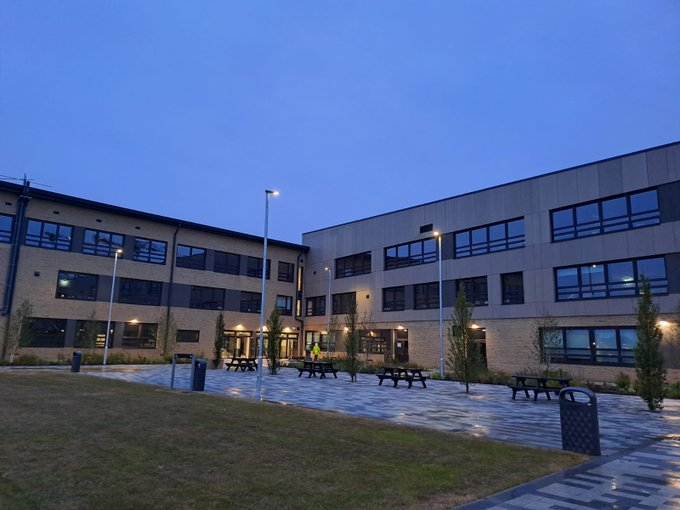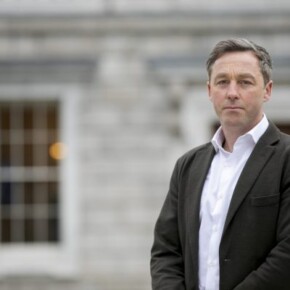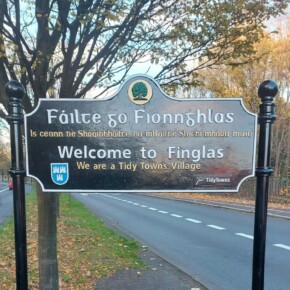Pushback to Belmayne school plans
Mike Finnerty 12 Mar 2025
Plans to house special education classes in “temporary” prefabs in a Belmayne school have been met with pushback from local elected representatives.
Local elected representatives have raised concerns about the potential conditions at the Belmayne Educate Together Secondary School, which would see both students in mainstream secondary school education and children with special educational needs being forced to use the same space and resources.
Under plans by the Department of Education, children with special needs would be hosted in prefabs, at the expense of other facilities at the school.
Students would lose access to pitches, a running track, and an autism-friendly sensory garden under the plans, which are supposed to be “temporary”, but “temporary” in the context of Irish political decision-making almost always turns out to be anything but.
The Department told the board of management that it wants to put special educational classes in prefabs for an “unspecified” period.
However, plans for said prefabs have hit a wall after a question posed by local Sinn Féin councillor Micheál Mac Donncha to Dublin City Council management revealed that there is no planning permission for an additional school on the site.
In response to Mac Donncha’s question, Dublin City Council Chief Executive Richard Shakespeare confirmed, “there is no planning permission for an additional school on this site.”
“The post primary school was consented under planning permissions 2600/20 (parent permission) and 3351/21 (amendments permission) which translates to a four-classroom special needs wing being incorporated in the development.”
“Whilst our Forward Planning team liaise with Dept. of Education regarding long term strategic planning, no specific discussions have been held relating to this site,” the reply read.
Mac Donncha commented, “this really shows the urgent need for the Department of Education to engage realistically with the school.”
“Children with special needs require school places and the secondary school and the wider community need the recreation space.”
The Sinn Féin councillor said, “a viable solution has been proposed, and now Minister McEntee needs to step in and make it happen.”
In February, Mac Donncha wrote to the Minister for Education, expressing concern about the issue.
“I am satisfied that the school is committed to providing an inclusive and safe environment for all students, and they believe this proposal would allow both groups to benefit from the shared outdoor area and the excellent new facilities; on the other hand if your Department’s proposal is persisted with the special school would be housed in prefabs and students of both schools would be deprived of adequate recreation space.”
He stressed that he, other elected representatives and the school itself are not opposed to housing students with special educational needs, but the Department are not willing to engage with the school on its alternative plan.
“We need to push for a solution that respects the education rights of all children,” the Donaghmede councillor said.
Social Democrats councillor Paddy Monahan remarked, “the Department of Education is notorious for allowing ‘temporary’ solutions to become semi-permanent as years and years pass with schools in the same temporary accommodation.”
“This would be far from ideal for the special school in this case and will be detrimental for the children attending Belmayne ETSS.”
“The space that has now been designated for a special school within the grounds of Belmayne ETSS was to accommodate important sports and physical education facilities for the secondary school,” he explained.
He said that the facilities aren’t a mere afterthought; he said they are a “vital part of the curriculum.”
“It is as vital a part of the curriculum as science labs and computer equipment.”
“Moreover, these grounds were to be shared by the school with sports clubs and community groups in the area, thus building community spirit and buy-in,” the Donaghmede councillor added.
Monahan stated, “the school’s suggested compromise arrangement using its existing special education classrooms is extremely sensible and generous; the Department of Education should use this period to ensure that the special school’s permanent accommodation is prioritised and fast-tracked.”
Labour councillor Alison Field said there are legitimate health and safety concerns about the conditions in the school, saying that “there is no place to go if a fire breaks out,” and that under the new plans, bike racks would be placed in the teacher’s car park.
“Nothing about this situation makes sense,” she said.
She questioned if a compromise could be reached where the special education classrooms could be placed on nearby public land and if the Department of Education could negotiate with owners of nearby privately-owned land to build the classrooms.
“Parents don’t realise that if their child secures a place, it would be in a school that is inappropriate for children with additional educational needs,” the Clontarf councillor said, adding that prefabs aren’t suitable for students with sensory issues.
A statement from the board of management at the school said, “the current solution of hosting the special school in the prefabs raises a huge amount of health and safety issues going forward and also restricts us in our enrollment in future years to a 1000 student school.”
“Schools with over 800 students require a standing area that includes 6 ball courts or 3080m². With the current plans, we are left with no safe assembly area for our students in the event of a fire or fire drill, potentially endangering the safety of more than 1000 students. This is a serious concern that the Department of Education has failed to address adequately despite numerous requests for clarification.”
They said their proposal is “much more cost effective and that it would make more economic sense than the prefab plan.
“We believe that the real costs of making amendments to the prefabs would be much higher than any amendments that need to be made to our permanent build to host the special school, such as installing a new lift if needed.”
“We cannot measure the cost savings in terms of preventing anti-social behaviour in Belmayne and the mental health of our young people,” they said.











